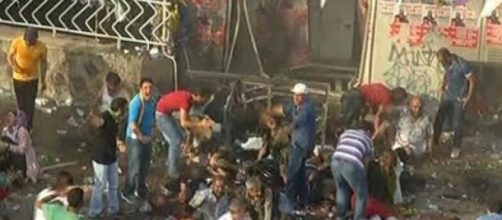On Friday, a rally of the Kurdish People's Democratic Party, part of the run up to the Turkish national elections, was targeted with a bomb attack as it was held in the city of Diyarbakir. In the wake of the explosions the rally was cleared. Initially it was thought to be one blast, but it was later determined there were two by security officials. Two people were killed and the current count of wounded is at roughly 100. The bomb was improvised in a barrel compacted with explosives and ball bearings.
The rally was attended by tens of thousands of people, with Diyarbakir being a largely Kurdish city in the South East of Turkey.
The area is expected to be key for the HDP to gain enough vote to enter parliament, as the South East of Turkey and indeed Turkey as a whole holds a large Kurdish population.
A party requires 10% of the vote to enter the Turkish parliament at which point they obtain votes from parties which did not make the bar, meaning if successful the HDP could threaten President Erdogan's Justice and Development Party (AKP) majority and ability to pass laws. At stake namely is the plan to pass legislation for a new constitution which will grant President Erdogan more powers and create closer ties to Islamic law on areas like alcohol and women's dress.
The attacks on the rally have been blamed on Turkish nationalists.
The AKP Prime Minister Ahmed Devotoglu, giving a speech in a neighbouring town, condemned the violence and assured his party was against such acts. Many in the AKP party have become riled by the successes of the HDP as many Kurds in Turkey as a whole have voted for the AKP in the last 12 years, with Kurdish votes becoming key to the AKP parliamentary majority.
The HDP candidate Prof. Mithat Sancar has stated the HDP's desire: "the biggest wish is the end of the war [between the PKK and the Turkish state] and a fair peaceful and democratic solution for Kurdish matters." The HDP has been accused of indirect links to the militant organisation The Kurdistan Workers Party, better known as the PKK, who are currently involved in operations against ISIS in conjunction with Iraqi Kurd and Syrian Kurd forces.
The PKK have fought a bloody insurgency against the Turkish Government during the 1980s and 1990s, which is why the AKP's opening up to the Kurdish electorate was so important.
In recent years some have put the rise of the HDP down to the AKP's open border policy in relation to Erdogan and the AKP's open aggression towards Damascus, as well as the open border policy in regards to the Syrian opposition. Recently Turkey officially began training rebels with the United States in central Turkey near the Syrian province of Idlib. President Erdogan's campaign for further powers and more conservative laws based on Islamic values have created divisions in the electorate and not only for the Kurds.
Other Turkish nationalist parties such as the Republican People's Party (CHP) and the Nationalist Movement Party (MHP) have recently unsuccessfully tried to expand on Kurdish votes, stating they are not willing to deal with 'terrorists' but want to draw a line between Kurdish people and PKK sympathisers. The election hangs in the balance, and given the 10% bar of the political system it seems the Kurdish vote is a lynch pin for any party in the election.
